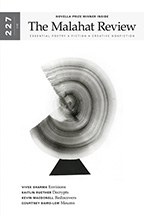Publishing Tips
What to Look for in Newsletters and Resource Lists

In the December 2017 Publishing Tip, Erika Dreifus outlines four helpful features to look for when subscribing to newsletters and resource lists for writers.
Erika Dreifus writes poetry and prose in New York. She is the author of Quiet Americans: Stories and has recently completed her first full-length poetry manuscript. She is also the founding publisher of The Practicing Writer, a free monthly newsletter that she has been sending out since 2004 that currently goes to more than 5200 subscribers, and shares weekly "Monday Markets" posts on her Practicing Writing blog as well. Visit her online at ErikaDreifus.com and follow her on Twitter @ErikaDreifus, where she tweets on "matters bookish and/or Jewish."
If you're a writer of fiction, poetry, and/or creative nonfiction, you probably run across a number of newsletters and lists that provide information about calls for work, contests, and related opportunities. Like me, you probably subscribe to quite a few of them. What I like best about them has even helped me shape the monthly newsletter I have been publishing since 2004, and the weekly blog posts I share between newsletter issues.
Sometimes, as all of the information that these newsletters circulate pings into your e-mail inbox or competes for your attention on Facebook and Twitter, it can become a bit overwhelming. Sometimes, it can seem repetitive, with one source's newsletter or list blending blandly into the next. Sometimes, you can spend so much time perusing every available resource that your actual writing time is shortchanged.
Over the years, I've identified at least four features that render some of these offerings distinctively more helpful than others to my own writing practice. They're what I look for as I consider subscribing to and/or sharing any particular newsletter or list.
Curious? Here’s what makes any opportunity-focused resource especially useful and pleasing to me:
1) It’s free.
I know. Contrarians may argue that one gets what one pays for. But there's something extremely appealing about writers and organizations who do something to help others find publication and profit without charging for it.
2) It tells you, up front, which opportunities charge fees for writers to submit their work.
I'm not interested in re-igniting the perennial debates about the ethics of these fees. But I can tell you that time and again, I'm especially grateful to those newsletter/list editors who determine which of the opportunities that they're sharing require fees and disclose that information up front, so I don't have to spend my time searching for it.
3) It also tells you, up front, which opportunities pay writers for published/winning work.
This one isn't all that dissimilar from what I've just written about the submission/reading fees. I'm not demanding that every resource limit itself to paying opportunities. (I'm a realist.) But I do appreciate, so very much, those editors who don't make me hunt—or, in some cases, go one more step and email a request—for that not-so-minor detail.
4) It credits the sources it relies on.
In assembling my newsletter issues and opportunity-laden blog posts I tend to include at least a few items I've discovered via someone else. And I do my very best, when sharing a call or competition that I've discovered from another writer or editor, to acknowledge that source by name (and weblink; I try to make sure that I've spelled the person's name correctly and that the link is active, too). Maybe it's my academic background (footnotes! bibliographies!) that makes me value this quality so highly when I see it elsewhere. Or it could that I'm just really, really fond of basic honesty and fairness.
When a list or newsletter manifests all—or even, most—of these qualities, I notice. I'm likely to subscribe.
And I'm much more likely to recommend the resource to other writers, too.
* * * * * * * *
The Malahat Review posts "Publishing Tips" as a bimonthly guest column on its ![]() website and in Malahat lite. Follow it in order to learn how to improve your professional skills, from the writing of cover letters, to what house style means, to choosing a rhyming dictionary, to having an author photo (as opposed to a selfie) shot. If you have a Publishing Tip you'd like to share, email The Malahat Review at malahat@uvic.ca, with "Publishing Tip Idea" in the subject line. Tips should be 750 words or less. If yours is accepted, you will be paid an honorarium of $50.
website and in Malahat lite. Follow it in order to learn how to improve your professional skills, from the writing of cover letters, to what house style means, to choosing a rhyming dictionary, to having an author photo (as opposed to a selfie) shot. If you have a Publishing Tip you'd like to share, email The Malahat Review at malahat@uvic.ca, with "Publishing Tip Idea" in the subject line. Tips should be 750 words or less. If yours is accepted, you will be paid an honorarium of $50.









